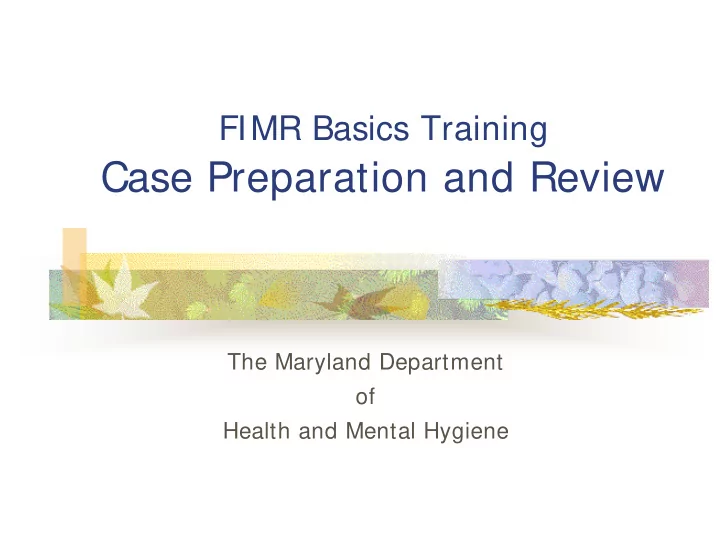

FIMR Basics Training Case Preparation and Review The Maryland Department of Health and Mental Hygiene
Preparing for Case Review Choose Case Review Team members Gather information Decide which cases to review Prepare for review meeting 2
Case Review Team Composition Multidisciplinary Broad representation is required to assure that systems issues, especially non-medical issues, can be identified in the process Expertise from the following areas should be represented on the team: Clinicians – Physicians, specialists (as needed basis) nurse practitioners, certified nurse midwives, OB nurses, licensed social workers, etc… 3
Team Composition (cont’d) Representatives from: Hospitals, community clinics, health department, substance abuse treatment, family planning and mental health services, allied health professionals PTA’s, corporations, community and civic organizations Funeral services, bereavement support groups, religious organizations 4
Team Composition- Staff FIMR Coordinator: Health department representative- MCH Correspondence with team members Schedule/arrange meetings Prepare cases for CRT meetings Track cases/data Case abstraction, maternal interview, and/or meeting facilitation 5
Team Composition- Value of a Meeting Chair Someone who can represent health department or hospital- leadership role Creditable expert in the field- can recruit team members, is influential Can convene leaders/stakeholders for community action FIMR communications- formal letters to physicians/hospitals, sharing of findings 6
Gathering Information to Tell the Story Process of gathering information on a case requires “investigative work”: Identifying visits that the woman had during her pregnancy with health care providers Abstracting records 7
Gathering Information (cont’d) Sources of information include: Birth and death certificates - Vital Statistics Medical records Hospital - delivery, transfer, infant death, ER visit Prenatal Care Provider – clinic or private practice, MCOs Maternal interviews Case management programs Other 8
Obtaining Medical Records Time consuming process Request must be made in writing on Health Department letterhead Allow time for records to be pulled Medical Records Department will notify you when records are ready for review. Appointment can then be made to review records. Best to form relationship with hospital, to make the process easier 9
Determine What Cases to Review Not all deaths need or should be taken to FIMR case review team Inappropriate cases for review: terminations, homicides CFR cases 10
Preparing the Case History Case History Template (Med Abstraction) Tool for abstracting medical records Provides summary of the case for presentation to the CRT – All information of relevance to the case. Customized version available for congenital syphilis Separate page for baby # 2, etc… in multiple gestation cases 11
Case History – Key Points Cases must be de-identified before final Case History is distributed at the meeting Incorporate all available information to provide the most complete picture Be sure times of admission and delivery are documented 12
Case History – Key Points (cont’d) Incorporating maternal interview findings Adds depth and valuable information to the case review process, although it is not essential to this process Allows mother’s “voice” to be heard 13
Case History – Key Points (cont’d) Tips to getting a maternal interview: Include info in hospital bereavement packet Ideal is to contact within 6 months Send a request letter (after cause of death has been determined) Allow mom to choose time and location- encourage private setting Offer incentive 14
Case History – Key Points (cont’d) Options for incorporating the maternal interview Insert key points or findings from the maternal interview into relevant sections of the Case History Form Attach as a separate document to the Case History Form May be difficult to check information against Case History Form 15
Conducting the Case Review Meeting Before the meeting: Determine whether experts not on the CRT need to be present Send meeting notice to confirm meeting date/time/place Determine who will facilitate the meeting FIMR Coordinator Chair Other designated person 16
Case Review Meeting (cont’d) During the meeting: Review confidentiality- have participants sign confidentiality statement Present the case using the Case History Form Clarify technical terms for all members Describe sequence – make sure cause of death is clear 17
Case Review Meeting (cont’d) Distribute the Case Discussion Guide Use the Case Discussion Guide to: Identify factors that contributed to poor outcome. Identify systems issues – breakdowns that occurred in the delivery of care. Formulate recommendations – focus on missed opportunities, best practices. 18
Case Review Meeting – Key Points All case information is de-identified. Identity of the woman, her caregivers, and institutions are all removed from Case History before a case is reviewed. Cases must be treated anonymously to ensure that the focus is on systems issues. When a review team member acknowledges that he/she knows the patient, physician, or hospital under discussion, the facilitator should remind the group of the principle of anonymity that applies to FIMR. 19
Case Review Meeting – Key Points (cont’d) Purpose of the review is to develop general recommendations, not individual case management and follow-up. Listen to the mother – her perception of events is critical to understanding what happened. Develop recommendations and come to a consensus before the meeting adjourns. 20
Case Review Meeting Follow-up Following the meeting: Collect all forms pertaining to the case-shred documents Summarize key discussion points using the Case Review Summary Form Submit copies of the FIMR sign-in sheet, and meeting agenda to DHMH’s Joan Patterson, via e-mail (Joan.Patterson@maryland.gov) Prepare recommendations for community action 21
Alternatives to Case Review Use meeting time for community action. Brief speakers - discuss issues that have come up in case review. Combine cases on a certain topic to have a more thorough discussion. 22
Recommend
More recommend